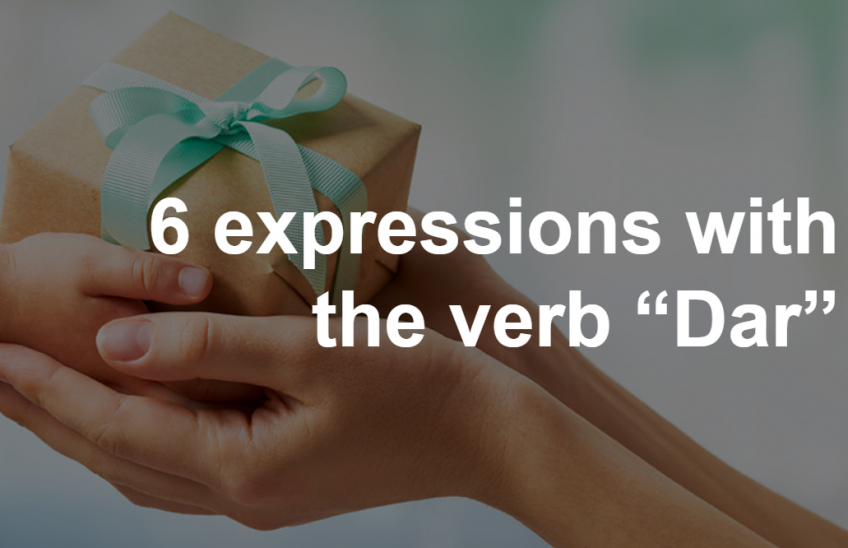Oi, tudo bem?
It’s always good to learn a new language, especially Portuguese! If you’ve ever studied one, you know that it goes way beyond grammar. It’s very important to also learn about the culture of the countries that speak that language so you can make your learning process a lot more meaningful.
In our classes, our teachers will help you scaffold your knowledge in Brazilian and European Portuguese, and teach you the grammar and vocabulary that will help you communicate with others. However, it’s also up to you to be curious and learn things by yourself and you can do it by watching movies, TV series and speaking with locals.
Once you start immersing yourself in the language, you’ll definitely hear phrases and idioms that make no sense to you because you’ll try to understand the literal meaning. This is what happens when people come across expressions with the verb “dar” which means “to give”.
| Dar (Presente do indicativo) | Dar (Pretérito perfeito/Past Simple) |
| Eu dou Você dá Ele/Ela dá A gente dá Nós damos Vocês dão Eles/Elas dão | Eu dei Você deu Ele/Ela deu A gente deu Nós demos Vocês deram Eles/Elas deram |
It can literally mean “to give”, for example:
- Eu amo dar presentes – I love to give gifts
- Ele me deu um presente incrível – He gave me an amazing gift
- Você pode me dar seu número de telefone? – Can you give me your telephone number?
- Minha mãe dá o melhor abraço do mundo! – My mum gives the best hugs in the world!
However, today we’ll be teaching you 6 expressions with the verb “dar”
1. Se dar bem
It has two meanings. The first one is to get along with someone.
E.g.
-Eu me dou bem com o Paulo (I get along with Paulo)
-A gente se dá muito bem (we get along really well)
-Eles não se dão bem porque pensam diferente (They don’t get along well because they think differently)
The second meaning is to be successful at something
E.g.
-Eu me dou muito bem em Português (I’m really good at Portuguese)
-Eles se dão muito bem em esportes (They’re really good at sports)
-A Maria está se dando bem na vida (Maria is going so well in life)
Watch out! As you can see, this expression has a reflexive pronoun, so you need to conjugate it accordingly.
Eu me dou bem / Você se dá bem / Ele se dá bem / Nós nos damos bem / Vocês se dão bem / Eles se dão bem
2. Dar um fora
It also has two meanings. The first one is to dump someone.
E.g.
-A Juliana deu um fora no André (Juliana dumped André)
-Eu não consigo dar um fora nele! Ele é tão chato, mas é tão lindo! (I can’t dump him! He’s so boring yet so cute!)
The second one is to give a short, rude, blunt reply.
E.g.
A: Oi, bom dia! (Hi, good morning!)
B: Bom dia pra quem? (Is it really a good morning?)
A: Nossa, não precisa me dar um fora. (Wow, you don’t have to be so rude)
– O Roberto é muito grosso, ele dá fora em todo mundo! (Roberto is so rude, he gives gruff replies to everyone!)
3. Dar o fora
It looks very similar to the previous one, the only thing that changes is “o”. This one means to leave/get out of a place, usually really quickly.
E.g.
-Que festa chata, vamos dar o fora daqui? (What a boring party, shall we get out of here?)
–Dá o fora daqui! or Dê o fora daqui! (Get out of here!)
– Aqui parece ser bem perigoso, vamos dar o fora. (This place seems very dangerous, let’s get out)
4. Dar um bolo/Dar um cano
No, it doesn’t mean to give a cake or to give a pipe! It means to stand someone up! It’s like making an arrangement with someone and not showing up (and you usually don’t tell them!)
E.g.
– O João me deu um bolo ontem. Ele me convidou para o cinema, mas não apareceu. (João stood me up yesterday. He invited me to the cinema, but didn’t show up)
– Eu não quero mais sair hoje, acho que vou dar um cano nela (I don’t want to go out anymore, I think I’ll stand her up)
– Eu acho ridículo quando as pessoas dão um bolo nas outras! (I think it’s ridiculous when people stand others up!)
5. Dar um pulo / Dar uma passada / Dar uma passadinha
We use these expressions all the time in Brazil! They can be used interchangeably and they mean to drop by a place.
E.g.
A: Oi, Fátima, que bom te ver! (Hi, Fatima! It’s so good to see you!)
B: Oi, Larissa! Quanto tempo! (Hi, Larissa! Long time no see!)
A: Dá um pulo lá em casa, a gente precisa conversar sobre a vida! (Drop by my house, we need to talk about life!)
– Se eu tiver tempo, dou uma passada na sua casa! (If I have time, I’ll drop by your house)
– Oi, amiga! Vamos dar uma passadinha no shopping? Quero comprar uma roupa nova. (Hey girl, shall we swing past the mall? I want to buy a new outfit)
6. Dar em cima
This is a romantic one! It means to hit on someone.
E.g.
– Eu acho que o Pedro gosta de você. Ele dá em cima de você o tempo todo! (I think Pedro likes you! He hits on you all the time!)
– Para de dar em cima de mim, eu não estou interessada (Stop hitting on me, I’m not interested)
– Eu vou dar em cima do Carlos pra ele me chamar pra sair (I’ll hit on Carlos so he asks me out)
What other expressions with the verb “dar” do you know? Share with your friends in the comments below! And as you know, if you’re interested in learning Brazilian and European Portuguese, contact us for private and group lessons in Melbourne, Australia. We have very qualified teachers who can help you master this beautiful language!
Até mais!
Luciana Veloso


Amei esta aula…gostaria de receber mais conteúdos!
Some truly quality content on this site, saved to favorites . Eba Ogden Blodget
Thanks for the blog. Really thank you! Keep writing. Kalli Field Zakarias
Great post! We will be linking to this great content on our site. Keep up the good writing. Anna-Diane Hillyer Georgia
Amazing! Its in fact amazing article, I have got much clear idea on the topic of from this post. Merle Ellsworth Buchheim